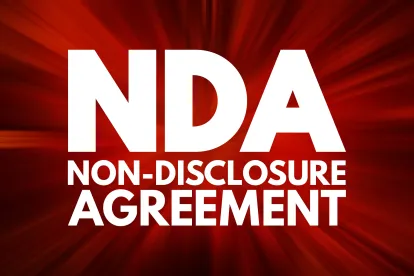The U.S. Securities and Exchange Commission (SEC) in recent years has taken an aggressive stance against employers over employment agreements that the agency believes impede its whistleblower program—as highlighted by a $10 million fine in 2023 imposed on an investment firm over its inclusion of nondisclosure and confidentiality provisions.
Quick Hits
- The SEC fined an employer $10 million in a settlement over charges that nondisclosure and confidentiality agreements impeded reporting of potential securities law violations.
- The settlement is part of a spate of enforcement actions against companies to protect the SEC’s whistleblower program.
In September 2023, the SEC announced it had settled charges with New York-based registered investment adviser D.E. Shaw & Co., L.P., for impeding its whistleblower program.
The SEC alleged that for years D.E. Shaw had required new employees to sign employment agreements that prohibited the disclosure of confidential information to third parties without including an exception for reporting potential securities violations to the SEC.
Additionally, the SEC alleged the firm required approximately 400 employees to sign releases in separation agreements to affirm that they had not lodged any complaints with any government agency or department as a condition of receiving deferred compensation and other financial benefits sometimes totaling millions of dollars.
Without admitting or denying the SEC’s findings, the firm agreed to pay $10 million to settle the charges and agreed to cease and desist from future violations.
Whistleblower Protections
The SEC’s settlement with D.E. Shaw was at least the third in 2023 with companies alleged to have used restrictive language in employment agreements and separation agreements that allegedly discouraged employees and former employees from reporting potential securities law violations to the SEC.
Section 21F-17(a) of the Securities Exchange Act of 1934 prohibits companies from taking “any action to impede an individual from communicating directly with the Commission staff about a possible securities law violation, including enforcing, or threatening to enforce, a confidentiality agreement … with respect to such communications.”
The SEC’s settlements in 2023 include one in which a private company was fined $225,000 despite SEC admitting that there was no evidence that any separated employee had actually failed to report a potential violation or that the company ever sought to enforce the agreement to stop a former employee from making a report.
In announcing the D.E. Shaw & Co. settlement, Gurbir S. Grewal, director of the SEC’s Division of Enforcement, stated “[e]ntities employing confidentiality, separation, employment and other related agreements should take careful notice of [the] enforcement action. The [SEC] takes seriously the enforcement of whistleblower protections and those drafting or using these types of agreements should take equally serious their obligations to ensure that they don’t impede whistleblowers from contacting the Commission.”
D.E. Shaw Action
The SEC alleged that from August 2011 through April 2019, D.E. Shaw & Co. had used employment agreements that contained confidentiality or nondisclosure provisions that prohibited employees from disclosing any confidential information to any outside party unless authorized by the firm or otherwise required by law.
Between 2011 and 2023, the firm’s “General Releases and Agreements” stated that the employees must “represent[] and warrant[] that” they had “not made, filed or lodged any complaints, charges, or lawsuits or otherwise directly or indirectly commenced any proceeding” against the firm “with any governmental agency, department, or official; any regulatory authority; or any court, other tribunal, or other dispute resolution body,” the SEC alleged.
In March 2017, the firm sent out a firmwide email notifying all employees that the confidentiality agreement did not prohibit them from providing information to any government regulators or enforcement agencies regarding potential violations of law. However, the firm did not add the whistleblower protection language to its employment agreements until 2019 and did not revise its releases until 2023, according to the SEC findings.
In June 2023, the firm voluntarily added language to its language to its releases “affirmatively advising employees of their right to contact regulators with concerns about potential legal or regulatory violations without notice” to the firm. D.E. Shaw also later made efforts to send letters to employees who started after the March 2017 firmwide email on the confidentiality agreements was distributed.
Despite those remedial measures, the SEC imposed a $10 million civil monetary fine. The SEC noted that it was aware of at least one former employee who was “initially discouraged from communicating” with the SEC about potential securities violations due to the confidentiality provisions in the firm’s employment agreements and releases.
Nondisclosure Agreements
Employers commonly use nondisclosure agreements or confidentiality agreements to protect their confidential information and trade secrets. However, the SEC’s recent spate of enforcement actions and the stated priorities of the agency signal that such agreements may be scrutinized with regard to whether they arguably impede employees and former employees from reporting potential violations of securities laws.
The Dodd-Frank Wall Street Reform and Consumer Protection Act established the “Securities Whistleblower Incentives and Protection” program with the addition of Section 21F to the Exchange Act and the creation of financial incentives to encourage whistleblowing. Section 21F specifically enables the SEC to bring actions against companies that use language in employment agreements and separation agreements to prohibit or discourage employees and former employees from reporting potential securities law violations.
Nondisclosure and confidentiality agreements have further come under scrutiny more broadly by state and federal regulators, particularly agreements that prohibit the reporting of harassment, discrimination, or other types of #MeToo allegations. The Federal Trade Commission is also considering a rule to restrict the use of noncompete agreements that could call into question the use of nondisclosure agreements that are arguably broad enough to restrict an employee’s ability to work in the same field.
Next Steps
Employers may want to consider reviewing their employment agreements, separation agreements, and other policies concerning whether they prohibit, restrict, or discourage employees and former employees from participating in the SEC’s whistleblower program.





 />i
/>i
